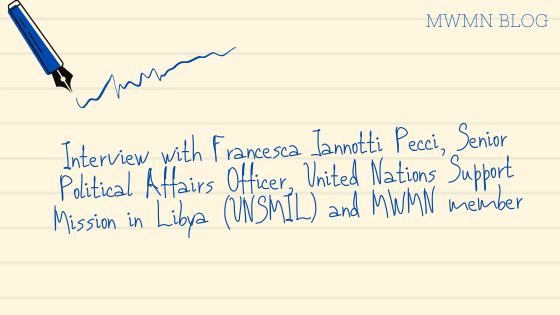Libya is at a crossroads. After the vote on the new executive authority that took place on 5 February, the country can move forward with the next steps of the Roadmap that should lead it to organise and hold democratic elections on 24 December 2021. What are the main challenges ahead to achieve sustainable peace and inclusive political stability in Libya?
The main challenge moving forward will be to secure the outcomes of the Libyan Political Dialogue Forum (LPDF). It would be especially critical to make sure a unified and legal session of the Parliament takes place for the vote of confidence to the cabinet that will be formed by the Prime Minister designated by the LPDF. Women in the House of Representatives (HoR) have an important role to play in supporting the convening of a unified session of the Parliament. The United Nations Support Mission in Libya (UNSMIL) has previously worked to strengthen the capacity of the HoR women caucus. Also, moving forward, the Tunis Roadmap has charted the priorities for the new temporary unified executive authority that should guide the new executive in managing the transition in the lead up to the elections on 24 December 2021. Both women in the LPDF, which maintain a monitoring role over the transitional period, and women outside of the LPDF have a big role to play in ensuring that the new executive authority fully implements the Roadmap adopted in Tunis in mid- November last year, including the commitment to appoint 30 percent of women in senior executive positions in the government.
What is the contribution of Libyan women to the different segments of the peace and stabilization process led by the LPDF, from the national reconciliation process to the full implementation of the ceasefire agreement and the fostering of economic reforms?
Women should play a leading role in shaping the national reconciliation process, in accordance with the Tunis Roadmap. Through their participation in senior executive positions, women can contribute to all aspects of the transition, including economic reforms and the ceasefire implementation architecture. The robust role already played by women in the framework of the LPDF should be recalled here. Women’s participation was around 20 per cent in the LPDF. This presence and their active role cannot be underestimated. Women have ensured that their voices were heard and commitments to their rights guaranteed. The LPDF Roadmap commits to human rights for all as well as the equal rights of women and men. Women in the LPDF were important bridge builders: for instance, they played a critical role in the Advisory Committee towards reaching consensus on a proposed selection mechanism for the executive authority, which was then adopted by the LPDF on 19 January.
Going forward, women have a very important role to play – as custodians of the process, as activists involved in fostering sustainable peace, as community organisers and leaders who promote rights-based reconciliation and transitional justice. Libyan women are activists, lawyers, politicians, medical professionals, teachers, and academics. As such, they have a role to play in every sector of society. Despite resistance and backlash from some conservative elements, Libyan women continue on their path towards peace, justice and accountability and a prosperous society for all.
The Roadmap states that women should hold at least 30 percent of senior executive positions. How realistic is this target and what are the obstacles to its attainment?
First, at the initiative of former Acting Special Representative of the Secretary-General (ASRSG) for Libya and Head of UNSMIL, Stephanie Williams, the Prime Minister designated by the LPDF, on 5 February signed an explicit commitment to uphold this target. This is an important and innovative guarantee that women and international partners can use to ensure it will be actually implemented by the new executive authority. UN Secretary-General Special Envoy for Libyan Ján Kubiš has continued to advocate for this commitment with the Prime Minister designated in recent weeks since his appointment. Also, the Prime Minister designated has met with LPDF women to discuss how he intends to implement the 30 percent target.
This target is hopefully only a minimum, not a ceiling, and will pave the way for even greater representation and meaningful participation of Libyan women in key posts. There will be challenges, but they can be overcome if Libyan women come together to demand their rights and, with the support of the international community, to hold the new united temporary executive accountable on the pledges made.
In which ways can the United Nations, on the one hand, and a network of women mediators such as the MWMN, on the other, help Libyans achieve their goals?
UNSMIL in consultation with international partners continues to work with women within the LPDF and with women groups to promote gender sensitive policies and political outcomes. It is important to maintain the momentum generated by the LPDF across the board and international partners can provide support to this end in close consultation with UNSMIL. A key aspect is to foster positive messages on women’s participation and representation, to encourage appointments and support female leaders and activists. Moreover, women in Libya are targeted and abused daily. This includes sexual violence and rape. The UN is engaged in monitoring and advocacy campaigns on women’s rights and on justice and accountability. These calls can and should be echoed by the MWMN and other actors. Any act of violence or incitement against women should be strongly condemned. Women participation in public life can put them at risk; their moral values and standing are often questioned and used for incitement against them, some women have been killed in broad day light while others have had to flee and go into hiding. The personal risks many Libyan women take cannot be downplayed. Until these issues are addressed women will not be able to participate on an equal footing with men. The UN and others have to support Libyan women in their fight for equality and justice.




